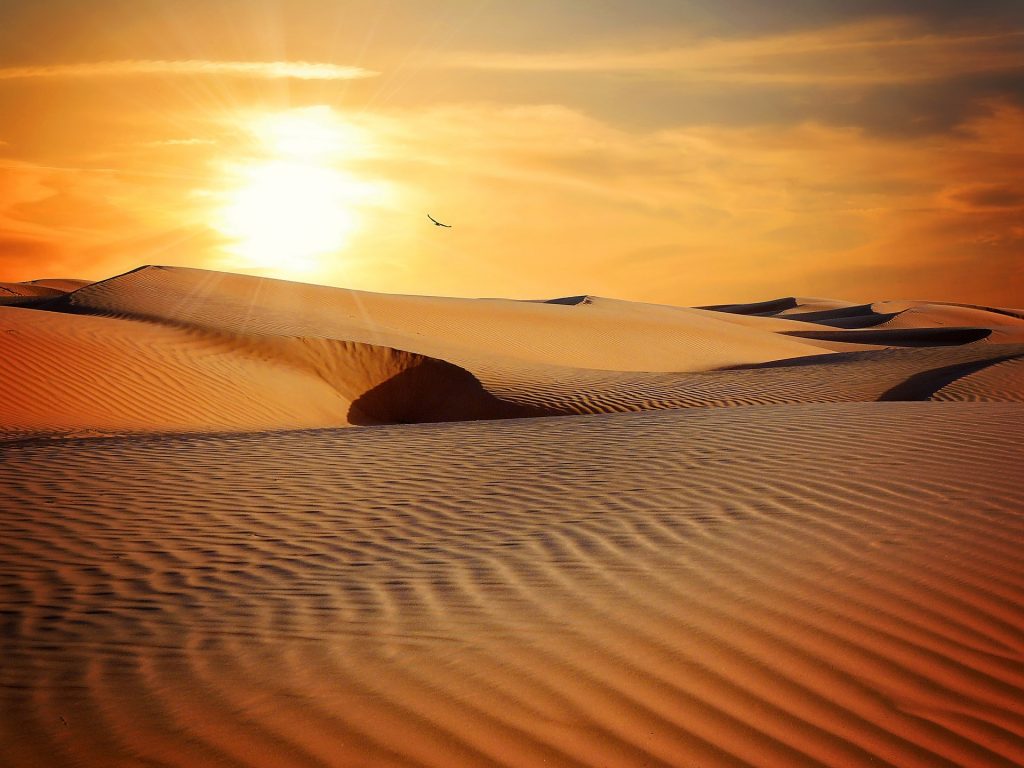
The short story entitled “The Desert” highlights the risk of extreme mood fluctuations and sudden changes of life plans, and of exhausting oneself or overstretching oneself by attempting to handle projects alone (at work or otherwise). The story can also be used to make it clear that the opposite of right is a different right, whereas the opposite of wrong is a different wrong, and that the opposite of a risk can be more hazardous than the risk itself. The story can be modified to describe someone who gets into difficulties in the mountains if the listener prefers Alpine landscapes.
Top of his bucket list of dreams had been to experience the desert – the vast expanse of the Sahara. Now his dream had come true. He had travelled there by plane, coach and jeep, all the way to some tiny speck of a village somewhere on the edge of the Sahara which he had found on the map. And he knew that beyond this village was nothing – no roads, no settlements, no water, only sand, stones and rocks. He did not really know what had prompted him to travel there. Was it simply a longing from the depths of his soul? Or perhaps he had simply been surrounded for too long by too many people, too much commotion, too many voices who all wanted something from him – his colleagues at work, his neighbours, his family at home, all pulling him this way and that; can’t you please… would you please… And now silence, nothing and no one around him.
He had longed for this for so many years, perhaps his whole life long. It is so quiet here than he can hear the sand and stones crunching under his feet with every step. He wants to drink in more of this vast expanse of solitude before night falls. The next rocky hill is not too far away in the distance, but the ascent is tiring – not because of the temperature, since the sun is already low in the sky and it has become remarkably cold, but because the sand slips out from under his feet whenever he takes a step forward, pulling him backwards. He finally reaches the summit of the hill, and looks forward into the desert and back at the village. The sun is starting to set in a red haze behind the village, and through the small windows of the huts he can clearly see the flickering of the fires which are already burning. Now he wants to leave this last piece of civilisation behind him. His heart longs for quiet, preferably away from everybody else. He makes his way down the valley towards the next hill. He wants to watch the red sunset once again from the top of this hill and see nothing but desert around him. The route there is not long, but it is exhausting because of the sand slipping out from under his feet and the boulders which he must climb around. Quickly it gets dark. When he reaches the top of the hill, the sun has disappeared. He stands there for a few minutes until his dream fades and he returns to reality. He is surrounded by pitch blackness – not the darkness he knows from home, to which one’s eyes can get accustomed, but a darkness which makes it impossible to see his hand in front of his face. Returning to the village is now out of the question. His concern now is that it has become bitterly cold, and seems to be getting colder and colder. He would never have believed that it could be so cold in the desert. Standing there in the dark in his summer shirt, shorts, and sandals, he feels completely helpless and is overcome by fear. He is afraid that he will not survive the night, that he will freeze to death, die alone and never be found. He thinks about his family, and his thoughts begin to go around in circles. What will they do when he doesn’t come home? Will they search for him, and will they ever find out where he is? He wants to see them again so much. He sees three lights on the horizon, like stars rising in more or less the same place where the sun set before. He thinks to himself, “Stars don’t rise in the west. Am I seeing things already? And these stars are moving sideways, almost as if they were electric torches…” A few hours later, he is sitting around the fire in a hut with the three African men who were carrying the torches and a number of other villagers. A woman wearing a veil hands him a plate of roasted lamb and a cup of goat’s milk. They communicate using their hands and feet, and he expresses his thanks to the villagers with signs and gestures. “Inshallah,” smiles a man, “…if Allah wills.”
